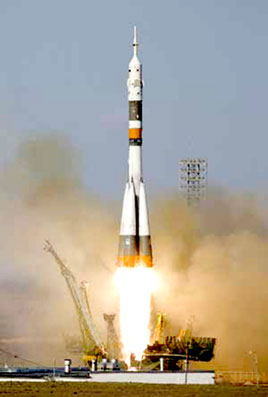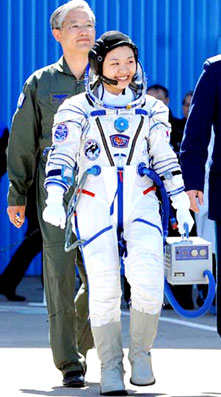Korea realized the dream of conquering the universe
On the evening of April 8, Kimchi residents were thrilled to witness the broadcast of Russia's Soyuz TMA-12 ship off Kazakhstan's Baikonour space airport carrying the country's first astronaut, and two Russian astronauts, heading into space.

The Soyuz board left the launch pad at Baikonour airport. (Photo: Reuters)
About 10 minutes after Soyuz left the launch pad, Baikonour Airport announced that the ship had flown into the orbit 240 km above the ground, or in other words the launch was successful. This historic event is a turning point in Korea's history of space exploration, making it the 9th country in Asia and the 37th in the world to enter the universe. Meanwhile, Dr. Yi So-yeon became the second female astronaut in Asia (after a Japanese colleague) and the 49th in the world to fly into space.
'This launch is Korea's first step in the goal of reaching the top seven cosmopolitan powers in the next 10 years, and will help Korea launch its own spacecraft carrying satellites in 2020. " President Lee Myung-bak stressed that, when he watched thousands of Seoul people watch live television on the Soyuz launch.
Now, with technical assistance from the Russian Federal Space Agency, South Korea is building the Naro space center in South Jeolla Province, which is expected to be inaugurated in September. Next, the Korean KSLV-1 rocket will launch into a satellite space weighing 100 kg. If everything goes according to plan, Korea will become the 9th country in the world to launch its own rocket launch right on the country later this year.

Female astronaut Yi So-yeon is expected to return to Earth on April 19. (Photo: Xinhua)
It is expected that around 10 pm on April 10 when Soyuz trains securely connect to the International Space Station (ISS) at 350 km above the ground, Yi So-yeon will begin 18 tests. Study in non-gravity conditions. Accompanying her on this historic trip was a herd of fruit flies consisting of 1,000. In about a week of staying on ISS, Yi will monitor the lives of these tiny creatures as well as the impact of the zero gravity environment on their activity, which is thought to cause genetic mutations. Scientists believe that 7-day life on fruit fly ISS is equivalent to 10 years of living in a human zero gravity environment.
Other trials include studying the germination, development and mutation of plants in the universe, the influence of the spatial environment on the cardiovascular system, intraocular pressure and Yi's face shape. In addition, the 29-year-old biology doctor will also monitor the process of sandstorm formation and migration from China to Korea. One of her important missions is to find a noise reduction solution in ISS. (To prevent fires, ISS is built with insulating materials but not soundproofed, so the crew always suffers from intense noise and vibration from the system on ISS). All of Yi's experiments were recorded and will be included in textbooks to teach Korean students - students.
- Dream of death
- Invented the program 'read', seize the dream
- Little-known facts about ancient fantasy spacecraft
- The reasons people dream when they go to sleep
- Korea launched the first satellite into space
- What does it mean to find yourself guilty?
- 50 years of conquering the universe of monkeys
- Discover the source of the dream
- Wi-Fi initially realized the dream of
- Equipment allows people to dream as they wish
- A medicine that will help you triple your Lucid dream experience
- Korea delayed the launch of the rocket
 Vietnam 5th Asian champion on fuel-efficient vehicles
Vietnam 5th Asian champion on fuel-efficient vehicles We can read all NASA studies completely free of charge
We can read all NASA studies completely free of charge Singer and songwriter Bob Dylan won the 2016 Nobel Prize for Literature
Singer and songwriter Bob Dylan won the 2016 Nobel Prize for Literature Scientific revolution in Asia
Scientific revolution in Asia